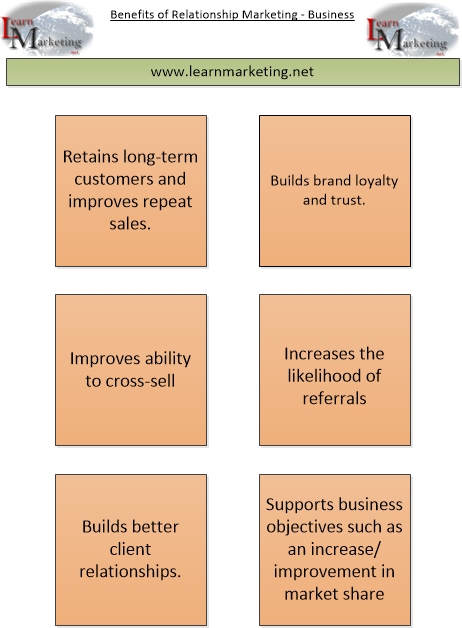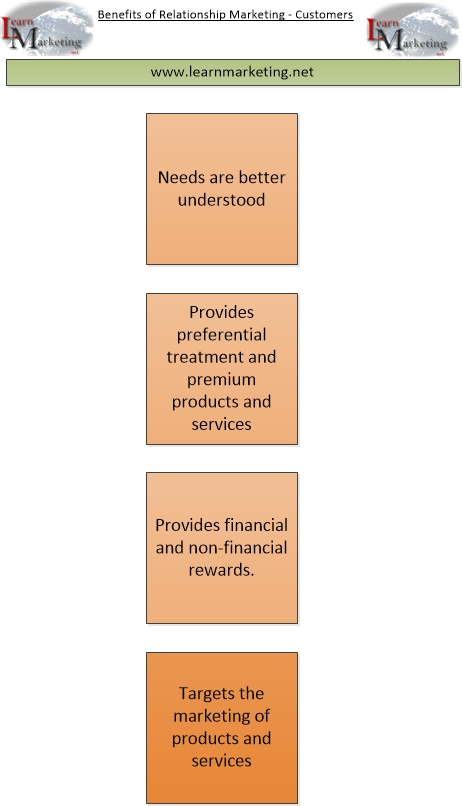Welcome to LearnMarketing.net
Benefits of Relationship Marketing - Unit 29
Introduction
Relationship marketing aims to create customer loyalty and secure life time custom. Firms invest in relationship marketing programmes because the costs will be a fraction of the benefits of a successful relationship marketing campaign.
Benefits Of Relationship Marketing
Benefits for the business
1.Retains long-term customers and improves repeat sales. The whole point of relationship marketing is to retain existing customers. It is cheaper to retain customers then attract new ones. Keeping exisiting customers satisfied and meeting their needs, will lead to increased sales. Supermarket retailers are really good at this, rewarding customers who shop regularly through their loyalty schemes.
2. Improves ability to cross-sell. Cross selling is selling related or complementary products to your exisiting customers. Customers that visit your business regularly, provides an opportunity for the company to try and sell them products related to previous purchases. Amazon are really good at offering products that you maybe interested in, based on previous purchases patterns.
3.Builds better client relationships. A good relationship with your customers enable you to better understand their needs and wants. Spending time with your customers allows you to build stronger bonds. High end establishments like Harrods normally have account managers with customers that spend alot of money at their establishment, thus building even a stronger bond.
4. Builds brand loyalty and trust. As an organisation builds on improving relationships with it's customers, meets their needs and wants and provides them with a product or service that benefit and enhances their life, over time brand loyalty and trust will be established. Relationship marketing plays a key role in this. Companies such as Apple, Amazon, Tesla, Aldi, and Tesco have succesfully developed that loyalty and trust over a long term period.
5. Increases the likelihood of referrals. This is linked to the above point, if relationship marketing improves brand loyalty and trust, the experience the customers gain is rewarding, they are then most likley to refer you to other potential customers. Often some companies will give a financial incentive for a referral for example banks in the UK will often give £50 -£100 to exisiting customers if they encourage a friend to open up a current account with them.
6. Supports business objectives such as an increase/improvement in market share, quality of service to existing customers and competitive advantage. Clearly if you look after exisiting customers and follow the above 5 points, your business is more likely to meet their objectives which maybe to increase market share, or expand the business.
7. Loyal customers are more likely to accept price increases because they are loyal to you
and trust your products and services.
8. Loyal customers are more likely to provide feedback which enables you to improve your product and services. They can even support innovation by identifying gaps in the market and suggesting ideas for your business.
9. Loyal customers will usually continue to provide you with custom after there is a lapse in the customer service (as long as you resolve the situation swiftly and to the customer's satisfaction).

Customer Benefits
1. Needs are better understood - Companies will do their best to try to maintain relationships with their existing customers. In order to do this, the company will do their best to understand customer needs, thus benefiting customers.
2. Provides preferential treatment and premium products and services & provides financial and non-financial rewards. - Customers with a long term relationship with a firm often get rewarded for their loyalty. This could be throught loyalty cards, exclusive access to particular services or reduced prices.
3. Targets the marketing of products and services. - One essential element of relationship marketing is collecting the data on the purchase behaviour of regular customers. This data collected allows companies to target specific products and services based on past purchase patterns.

Conclusion
It takes a lot of time and effort to build relationships with customers but the list of relationship marketing benefits is endless. The ultimate benefit is an increase in sales, market share and dominance.





